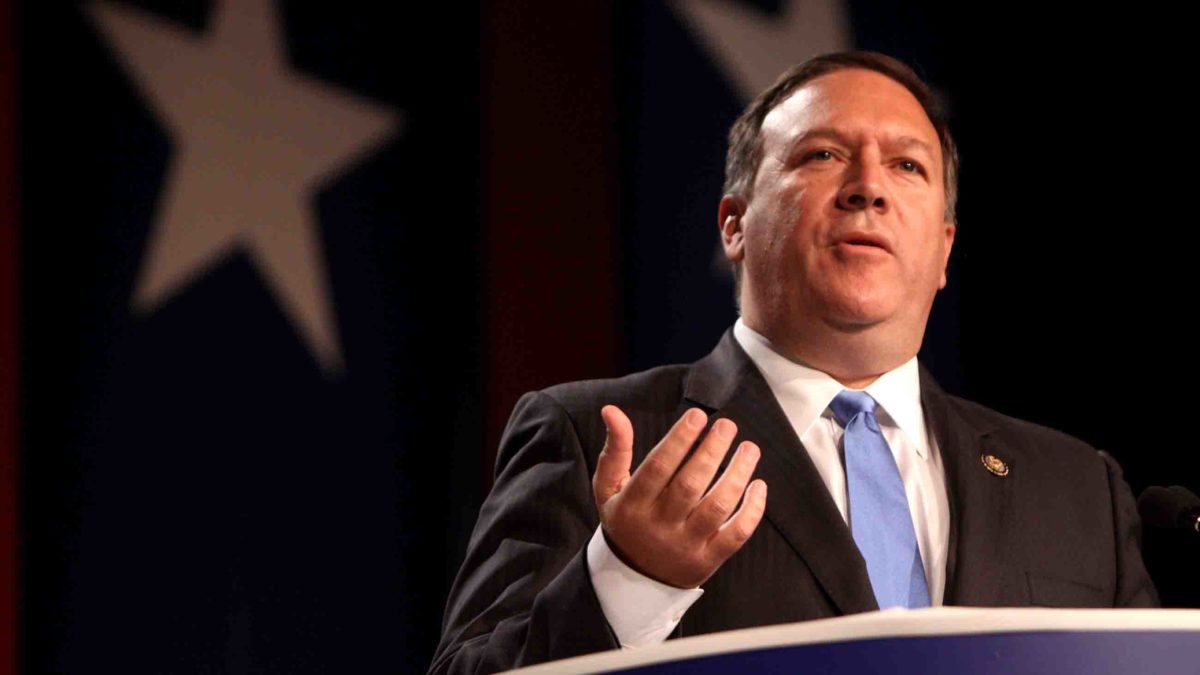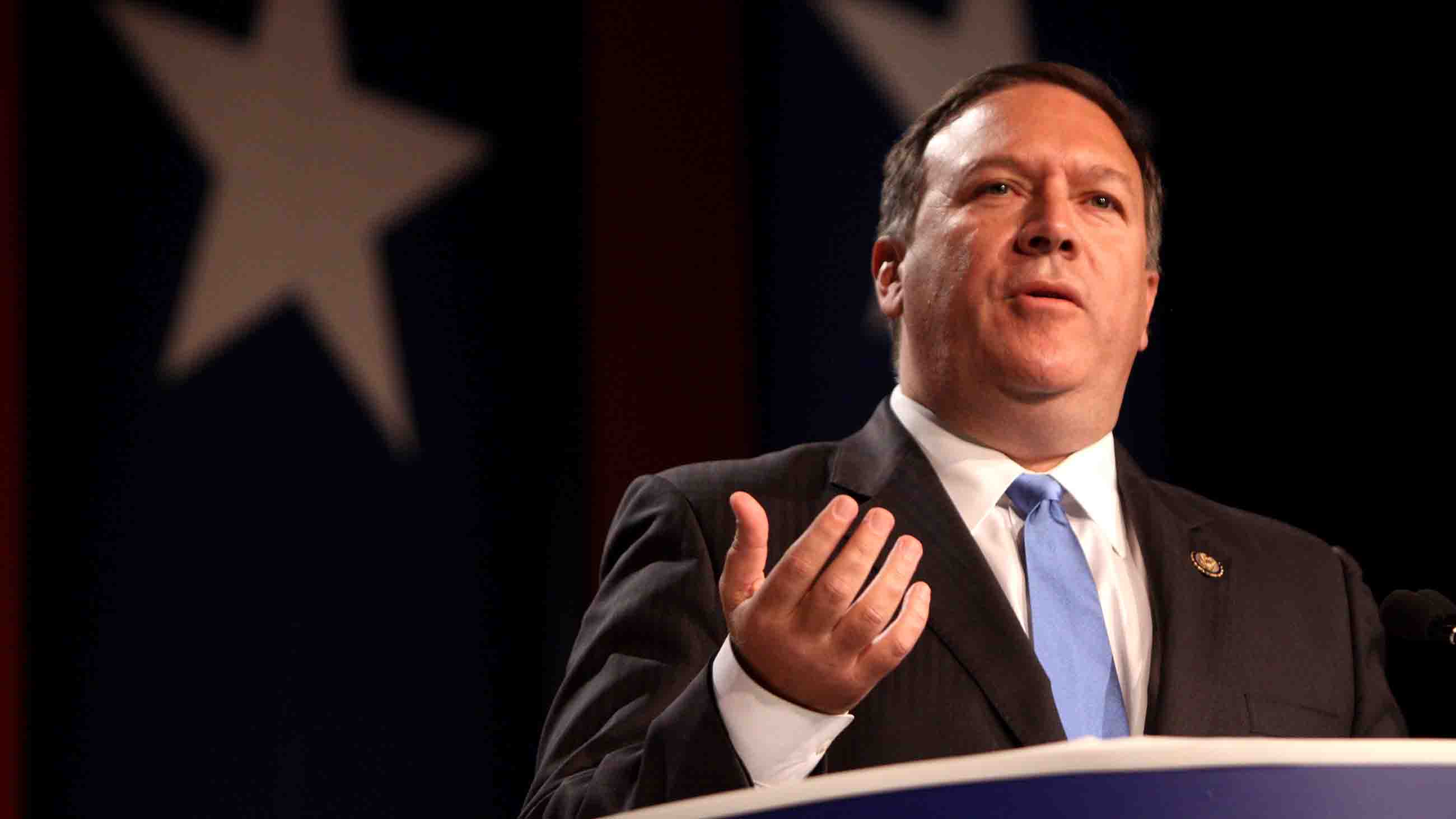President Trump continued the shuffle of his administration this week, making staff changes that seem to signal the end of debate within the White House on how to approach — or ignore — the issue of global warming.

Trump has announced Mike Pompeo, a climate skeptic, as his pick to replace Rex Tillerson as secretary of state.
Visual: Gage Skidmore/Flickr
Following the bizarre handling of Rex Tillerson’s removal as secretary of state on Tuesday — in which Tillerson reportedly found out about his ouster via Twitter — Trump announced CIA director Mike Pompeo as his replacement. Pompeo, a former Kansas congressman, is a climate change skeptic and opponent of the Paris climate agreement.
Despite scientific consensus that global warming is occurring and is caused by human activity, Pompeo has pushed the false narrative that research on the issue is inconclusive. In 2015, he criticized President Barack Obama for what he described as a “perverse fixation on achieving his economically harmful environmental agenda.”
If confirmed to his new position, Pompeo would be responsible for representing the United States at international climate talks, including a summit in Poland this December. Though U.S. participation at such meetings was diminished under Tillerson, a former ExxonMobil executive, he was one of the few people in Trump’s inner circle who supported staying in the Paris agreement.
Whispers within the administration suggest that disruption across other scientific agencies may follow, with talk that EPA Secretary Scott Pruitt may be tapped to replace Jeff Sessions as U.S. Attorney General. Some sources within the EPA have hinted that such talk was started by Pruitt himself, as he reportedly voiced interest in the position back in January.
These changes come as 217 executive branch positions remain without a nominee, including director of the Office of Science and Technology and Policy, which is currently led by Michael Kratsios, an OSTP official with no science training.
Also in the news:
• Stephen Hawking died Wednesday at the age of 76. Heralded by many as a modern-day Einstein, Hawking was known for his work involving black holes, discovering in the 1970s that they emit electromagnetic radiation. While praise for his work in this realm abounded, so too did fond memories of his role as a promoter of science. Many thanked Hawking for introducing them to the beauty of physics and recalled his passion for achieving what he called his “simple goal”: “complete understanding of the universe, why it is as it is and why it exists at all.” (Undark)
• NASA astronaut Scott Kelly’s DNA did not change in space, though such claims began circulating this week, following a NASA news release posted in late January about the space agency’s twins study. Following numerous exaggerated and distorted stories (many of which have now been corrected) many science journalists, along with Christopher Mason, the lead author of the NASA study, have made efforts to clarify the findings. Scott Kelly’s DNA has not been altered: It is his gene expression that has changed. The original NASA Twins Study sought to examine the effects of space travel on gene expression: the ways in which genes are turned on and off over time. Gene expression is affected by a variety of factors, including the environment, aging, and exposure to illnesses, toxins, and chemicals. (BuzzFeed News)
• In 1992, 1,700 leading scientists — including a majority of living Nobel Prize winners — issued a manifesto warning that “human beings and the natural world are on a collision course.” Earth’s atmosphere, water and soil resources, oceans, forests, living species — all were “suffering critical stress,” the scientists said. Now a “Second Notice” asserting that the situation is “getting far worse” has gone viral. Since it was published in the journal BioScience in December, a scientist at the University of Sydney in Australia has tracked its popularity using the Altmetric algorithm, which measures attention given to scientific papers by news outlets and social media. “Second Notice,” he reports on Twitter, is now in sixth place out of more than 9 million publications since the algorithm was devised six years ago. (First place belongs to former President Barack Obama’s review of the U.S. health care system for JAMA in 2016.) (EurekAlert)
• What’s a Savannah sparrow to do if his sweetheart can’t hear his love songs over the clamor of oil pumps and drills? According to researchers in Canada who analyzed hundreds of hours of sparrow love songs, he has to change his tune — lower the pitch of the opening notes so the motif isn’t drowned out by the din of screw pumps, and alter the middle section. “They’re tailoring their songs depending on which part of their message is the most affected,” said Miyako Warrington, the University of Manitoba biologist who led the study. “This seems to show a complex level of adaptation. It’s not just everybody talking louder.” While scholars have long known that urban birds sound different from country birds, the impacts of industrial noise pollution on wildlife are only beginning to be understood by scientists. (New York Times)
• The Securities and Exchange Commission this week brought formal fraud charges against Theranos — a startup that once promised to revolutionize blood-testing — and its founder, Elizabeth Holmes, capping a three-year downward spiral for a company once valued at $9 billion. The SEC complaint is focused on actions of cheating investors; it alleges that Theranos overstated everything from its income to the capabilities of its technology. The public problems for Holmes and her once admired Silicon Valley startup began with a 2015 investigation led by Wall Street Journal investigative reporter John Carreyrou, which showed that far from advancing the field, the company was secretly using testing technology developed by others. This week both Theranos and Holmes agreed to settle the SEC cases, but did not admit or deny wrongdoing. Holmes also agreed to pay a $500,000 fine, give up voting control of the company she founded, return all shares granted under illegal circumstances, and pledge not to take a position leading another public company for a full decade. (STAT)
• And finally, something the Cheshire Cat has always known: Scientists from the University of Wisconsin-Madison say they’ve uncovered evidence that smiles can trigger real physiological responses — including increased levels of stress hormones — in those viewing them. The researchers had 90 subjects deliver speeches into a video camera, after which they were exposed to one of three different types of smiles, categorized as “reward smiles,” “affiliative smiles,” or “dominant smiles.” Among other findings, which were published this month in Nature: Scientific Reports, the scientists detected increases in the release of the stress hormone cortisol for all subjects — but levels of the hormone shot up roughly three times as high among speechmakers who saw the condescending, dominant smile. “Facial expressions really do regulate the world,” the lead researcher was quoted as saying. “We have that intuition, but there hasn’t been a lot of science behind it.” (Science)










